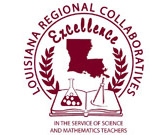

The Louisiana Regional Collaboratives for Excellence in Science |
||
2008-2009 HighlightsLouisiana has two regional P-16 partnerships linking universities with elementary and high school science teachers to provide sustained and high intensity professional development opportunities:
To date, the Louisiana Regional Collaboratives (LRCs) have served approximately 206 teacher leaders from 22 parishes who in turn have mentored and provided workshops to approximately 600 teachers from parishes across the state of Louisiana, hence, impacting the achievements of approximately 48,000 students. Sixty one percent of the teachers served are Caucasian, 38% are African American, and 1% Other. The LRCs have worked with and trained teacher leaders from the following parishes: Caddo, Bossier, Webster, Claiborne, Bienville, Union, Jackson, Lincoln, Morehouse, Ouachita, Caldwell, Ascension, Iberville, Point Coupee, Baker, West Baton Rouge, Zachary, Orleans, Jefferson, St. Landry, Lafourche, and East Baton Rouge. These teacher leaders are providing outreach activities to teachers in parishes across Louisiana. Training has occurred in a variety of sciences including the Jason Project, Polymer Science (Recycling) Chemistry, earth sciences, GEMS workshops, The Private Eye, two-week Summer Institute on Designing Effective and Engaging Inquiry-Based Labs, and Shell/LRC NanoSCIENCE engineering and science. The LRCs have organized Honoring the Teachers events to recognize teachers, engage policy makers and elected officials, reward Shell as a corporate partner, and showcase the partnership in media outlets and the community. Furthermore, the LRCs have provided science fair mini-grants to encourage and excite students to pursue STEM careers. The LRCs have also forged communications with Tulane University, Xavier University, Sci-Port Discovery Center, LSU-Shreveport and Bossier Parish Community College to forge new Regional Collaboratives in Louisiana in the service of additional teachers in those regions. LA Tech/Grambling State University Regional Collaborative
|
| Leveraging Resources Leveraging local, state and national resources is the cornerstone of the Southern University/Louisiana State University Collaborative. Partnerships among the Louisiana Department of Education through their Math Science Partnership Programs and the Louisiana Board of Regents have provided information for compliance with all state education mandates and assisted the SLC in offering services to the education community. In addition, the SLC has forged partnerships with many education organizations and agencies, including the JASON Foundation, National Alliance of State Science and Math Coalitions (NASSMC), National Science Teachers Association (NSTA), Louisiana Science Teachers Association (LSTA), Louisiana Association of Science Leaders (LASL), Louisiana Environmental Education Commission, Louisiana Art and Science Museum, the Center for BioModular Multi-Scale Systems, Baton Rouge Recreation and Park Commission and LIGO (Laser Interferometer Gravitational-Wave Observatory). Through these partnerships and many other connections, the SLC has been able to provide services that not only further science education across south Louisiana, but also provide extensive resources for K-16 teachers of science. SLC JASON Train-the-Trainer Leadership Institute Sustainability is a key component of the South Louisiana Collaborative. Programs are embedded within an existing infrastructure to ensure successful completion and continuation of the SLC. Plans are currently underway to kick-off the South Louisiana JASON Train-the-Trainer Leadership Institute July 13-14. This institute is being led by a nationally recognized JASON Lead Trainer to provide leadership development to our first cohort of two-person teams, to provide professional development and mentoring to 160 of their peers over the course of the 2006-07 academic year. . |
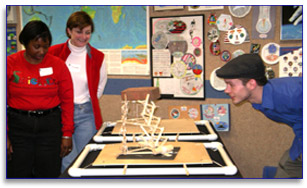 |
Preservice and alternative certification teachers as well as practitioners requiring middle school certification visit the Challenger Center and work together to experience hands-on science.
|
|
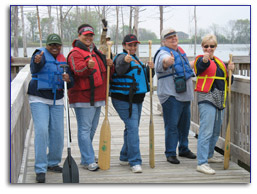 |
|
We came, we conquered the Poverty Point Reservoir! |
|
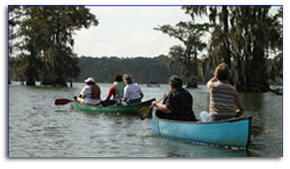 |
|
SLC participants enjoy the flora and fauna of Lake Martin and learn about the impact of the wetlands on South Louisiana. |
|
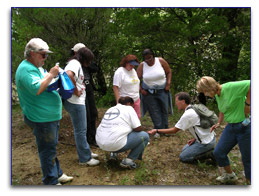 |
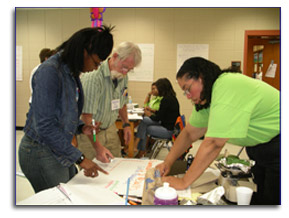 |
SLC participants working in the field with noted paleontologist Gary Stringer from the University of Monroe to locate and identify marine fossils found in North Louisiana. |
Middle School Teachers working on JASON: Disappearing Wetlands activities. |
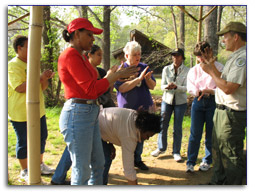 |
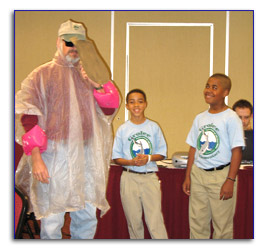 |
Making cooking stones at Poverty Point to learn how Native Americans lived and worked in the area. |
Learning about the wetlands at the Louisiana Environmental Education Symposium! |
